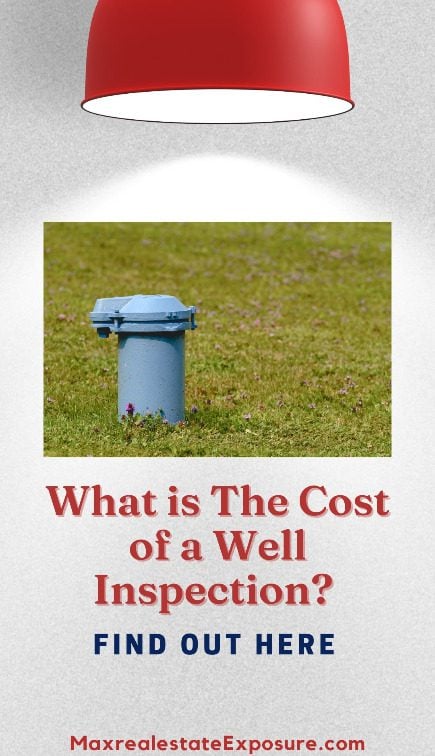 Are you wondering what a well inspector charges for an inspection?
Are you wondering what a well inspector charges for an inspection?
Having a reliable source of clean water is crucial for any homeowner, especially those who rely on well water. Regular well inspections help ensure the safety and quality of the water supply.
However, many homeowners wonder about the well inspection costs.
We will examine the factors that influence the price of a well water inspection and provide you with a better understanding of what to expect when hiring a well inspector.
Average Cost of Well Inspection
While the cost of well inspections can vary, the average price typically falls within a specific range. On average, homeowners can expect to pay between $300 and $600 for a standard well water inspection. However, as mentioned earlier, this cost can increase depending on various factors.
It’s essential to note that the cost of a well water inspection is a worthwhile investment to ensure the safety and quality of your water supply.
Regular inspections can help identify potential issues early on, preventing more significant problems and costly repairs in the future.
Inspecting a private well is a standard part of due diligence when buying a home. It typically happens when buyers conduct home inspections.
Testing a well should be on your home inspection checklist when there is no public water.
Factors Affecting Well Water Inspection Cost
The cost of a well water inspection can vary depending on several factors. Here are the key factors that can influence the overall pricing:
Geographical Location
A well water inspection cost can vary based on your location. Factors such as local competition, availability of well inspectors, and regional pricing trends can all play a role.
The cost may be slightly higher in areas where well inspections are in high demand.
Depth and Type of Well
The depth and type of well can impact the cost of testing well water. Deeper wells or those with complex systems may require additional equipment and expertise, increasing the overall cost. Shallow wells, on the other hand, might be less expensive to inspect.
Inspection Scope
The inspection scope can also influence the pricing. Some homeowners may opt for a basic inspection that covers essential parameters such as water quality testing and visual inspection of the well components.
Others may prefer a more comprehensive inspection that includes additional tests such as bacterial analysis, mineral testing, and flow rate measurement. The more extensive the assessment, the higher the cost is likely to be.
Additional Services
Sometimes, additional services may be required during the inspection process. For example, if the inspector discovers issues with the well pump or pressure tank, they may recommend further evaluation or repairs.
These additional services will incur extra costs beyond the initial inspection fee.
Buying a Home With a Well: What You Should Know
 If you’re in the market for a new home, you may come across properties that rely on well water instead of a municipal water supply.
If you’re in the market for a new home, you may come across properties that rely on well water instead of a municipal water supply.
While well water can be an excellent source of clean and fresh water, there are certain things you should know before buying a home with a well.
Here are some essential considerations to remember when purchasing a property with a well.
Water Quality Testing
One of the most crucial aspects of buying a home with a well is ensuring the water quality meets your standards. Unlike municipal water supplies that are regularly tested and treated, well water quality can vary significantly.
Conducting thorough water quality testing to check for contaminants such as bacteria, heavy metals, nitrates, and other potential pollutants is essential. This testing will give you peace of mind and help you make an informed decision about the property.
Regular testing can be even more essential if a septic system services the home. You should also inspect the septic system before buying a house.
The cost of septic system replacement isn’t cheap.
Well Quantity Inspection
Before finalizing the purchase, it’s advisable to have a professional well inspection conducted. A well assessment involves assessing the condition and functionality of the well, its components, and the overall water system.
The well inspector will check for any potential issues, such as leaks, pump performance, pressure tank condition, and the overall integrity of the well structure. This inspection will give you valuable insights into the current state of the well and any repairs or maintenance required.
Permitting and Compliance
When purchasing a home with a well, it’s crucial to verify that the well and its associated permits comply with local regulations.
Well permitting requirements vary by jurisdiction, and it’s essential to ensure that the well has been appropriately permitted and meets all applicable codes and standards.
Working with a qualified well inspector or consulting local authorities can help you navigate these requirements and ensure compliance.
Many homeowners try to skirt building permit requirements, so checking is essential.
Maintenance and Upkeep
Owning a home with a well requires ongoing maintenance and upkeep to keep the system in optimal condition.
Regular well water maintenance, such as inspecting the well cap, testing the water quality, and monitoring the performance of the pump and pressure tank, is necessary to ensure the continued supply of clean water.
Understanding the maintenance requirements and associated costs is essential for responsible, well-ownership.
Water Quantity and Supply Are Crucial
In addition to water quality, it’s essential to assess the quantity and reliability of the water supply from the well. Factors such as well depth, yield, and the local water table can affect water availability.
Consulting with a well expert or local hydrogeologist can provide valuable information about the well’s capacity and the likelihood of experiencing water shortages or seasonal fluctuations in supply.
Asking the seller if they have ever had any water issues is wise. When you ask a direct question like this, a seller must be honest, even in non-disclosure states.
Emergency Backup Plan
An emergency backup plan is wise when relying on a well for water supply. Power outages or well equipment failures can temporarily disrupt the water supply.
Consider having alternative water sources or a backup power generator to ensure access to water during such situations.
Well Maintenance Tips
 Proper well water maintenance ensures a continuous supply of clean and safe water.
Proper well water maintenance ensures a continuous supply of clean and safe water.
Here are some essential well-maintenance tips to keep in mind:
Regular Water Testing
Regular testing is crucial in identifying any changes in water quality. Test your well water at least once a year for common contaminants such as bacteria, nitrates, and other pollutants.
Additionally, consider testing after significant repairs or if you notice changes in water taste, odor, or appearance. Testing can be done through certified laboratories or with at-home testing kits.
Protect The Well Head
The wellhead is the visible part of the well system above the ground. It is essential to protect it from potential sources of contamination.
Keep the area around the wellhead clear of debris, chemicals, and potential pollutants. Ensure the well cap or seal is intact and in good condition to prevent insects, rodents, or surface water from entering the well.
Practice Water Conservation
Conserving water benefits the environment and reduces strain on your well system. Avoid excessive water usage, fix leaks promptly, and consider installing water-efficient fixtures.
Water conservation can help maintain a sustainable water supply and reduce the strain on your well pump and system.
Maintain The Well Pump and Pressure Tank
The well pump and pressure tank are critical components of the well system. Regularly inspect the pump and pressure tank for signs of damage, leaks, or malfunction.
Follow the manufacturer’s guidelines for maintenance and consider scheduling professional inspections or servicing every few years. To ensure optimal performance, well pumps may require periodic maintenance, such as cleaning or replacing filters.
Monitor Water Quantity and Pressure
Keep an eye on your well’s water quantity and pressure. If you notice a sudden decrease in water flow or low pressure, it could indicate a problem with the well or pump. Address any changes promptly by consulting a well professional to diagnose and resolve the issue.
Keep Records
Maintain a record of well-maintenance activities, including inspections, repairs, and water testing results. This documentation will help you track the history of your well, identify patterns or issues, and provide valuable information for future maintenance or when selling the property.
Avoid Chemical Contamination
When working with chemicals, such as fertilizers, pesticides, or cleaning agents, be cautious to prevent them from reaching the well area.
These substances can potentially seep into the groundwater and contaminate your well water. Follow the instructions and guidelines provided by the manufacturers to minimize the risk of chemical contamination.
Have a Professional Well Inspection
Schedule periodic professional well inspections, even if you don’t notice any issues.
Well inspectors have the expertise and tools to thoroughly assess the condition of the well, identify potential problems, and provide recommendations for maintenance or repairs. A professional inspection can catch minor issues before they escalate into major, costly problems.
Choosing a Well Inspector
Understanding how to choose a well inspector is essential.
When selecting a well inspector, it’s essential to consider their qualifications and experience. Look for inspectors who are licensed, certified, and have a good reputation within the industry.
Reading online reviews and seeking recommendations from friends, neighbors, or local authorities can help you make an informed decision.
You can search for well inspectors near me online to get the closest companies to your location. Well testing near me is also a useful term to find inspectors nearby.
Final Thoughts on The Cost of Well Testing
A well water inspection is a crucial step in ensuring the safety and quality of your water supply. A well water inspection cost can vary depending on location, well depth, inspection scope, and additional services required.
On average, homeowners can expect to pay between $300 and $600 for a standard inspection. Investing in a well water inspection is wise to help you maintain a healthy water supply and avoid costly issues in the long run.
About the Author: The above Real Estate information on the cost of a well inspection was provided by Bill Gassett, a Nationally recognized leader in his field. Bill can be reached via email at billgassett@remaxexec.com or by phone at 508-625-0191. Bill has helped people move in and out of Metrowest towns for 37+ Years.
Are you thinking of selling your home? I am passionate about Real Estate and love sharing my marketing expertise!
I service Real Estate Sales in the following Metrowest MA towns: Ashland, Bellingham, Douglas, Framingham, Franklin, Grafton, Holliston, Hopkinton, Hopedale, Medway, Mendon, Milford, Millbury, Millville, Northborough, Northbridge, Shrewsbury, Southborough, Sutton, Wayland, Westborough, Whitinsville, Worcester, Upton, and Uxbridge MA.

